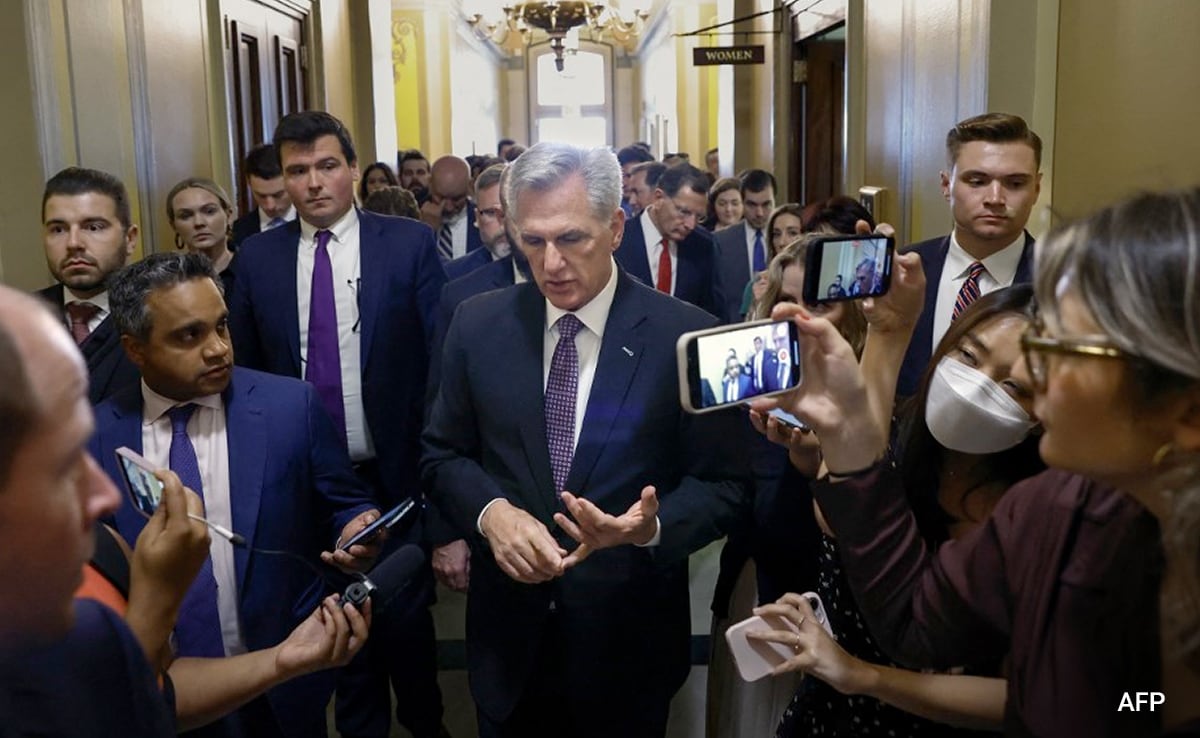US Debt Ceiling Talks Halted Over ”Serious Differences” As Default Deadline Inches Closer

US Speaker of the House Kevin McCarthy talks to reporters at the US Capitol
Crucial talks between US House of Representatives Republicans and President Joe Biden’s administration about raising the debt ceiling briefly resumed on Friday before concluding with no progress, Guardian reported. As per the report, negotiations came to an abrupt standstill earlier in the day when House Speaker Kevin McCarthy said it was time to ”pause” talks. The negotiating teams convened again in the evening only to quickly call it quits for the night.
Notably, the developments come as the US faces a deadline as soon as June 1 to raise the country’s borrowing limit, now at $31 trillion, to keep paying the nation’s bills.
”At the direction of the speaker of the House, we re-engaged, had a very, very candid discussion talking about where we are, talking about where things need to be, what’s reasonable and acceptable,” Rep. Garret Graves, Mr McCarthy’s lead negotiator, told reporters after Friday night’s meeting.
”This wasn’t a negotiation tonight. This was a candid discussion about realistic numbers, a realistic path forward, and something that truly changes the trajectory of this country’s spending and debt problem,” he added.
However, when he was asked if he was confident that a framework to raise the debt ceiling could be reached by this weekend, he said ”No”. The timing for the next meeting remains undecided.
While the Congressional Republicans are demanding budget cuts in exchange for lifting the so-called debt ceiling, the White House has insisted for months that the nation’s credit should not be up for negotiation. The White House has called the Republican proposal “a blueprint to devastate hard-working American families”, as per BBC.
Last week, President Joe Biden said he is confident a deal can be reached with Republican leaders to avert a potentially catastrophic US debt default. However, the two sides have remained at an impasse despite weeks of warnings from government officials and bankers that a default could unleash drastic consequences, including a possible recession and likely global financial contagion.
Treasury Secretary Janet Yellen has warned a default could occur by June 1, while the nonpartisan Congressional Budget Office forecast on Friday the date of June 15.
Speaking at a news conference in Hiroshima, press secretary Karine Jean-Pierre said, “We have serious differences. And this is going to continue to be a difficult conversation. That’s not lost on us.” She also questioned whether congressional Republicans were serious about wanting to cut the deficit and reaching a “reasonable” deal.
Meanwhile, President Biden reiterated his stand on Saturday and said he still believed a default could be avoided.
“I still believe we’ll be able to avoid a default and we’ll get something decent done,” Mr Biden told reporters in Hiroshima, Japan, where he is attending a meeting of leaders of the Group of Seven rich nations. He will be back in Washington on Sunday after cutting short his foreign trip. Many Republicans have criticized him for taking the trip to Japan at a key point in the talks.
In the US, the debt ceiling is a legislative limit on the amount of money that the US federal government can borrow. It was created under the Second Liberty Bond Act of 1917 and is also known as the debt limit or statutory debt limit.
When the debt ceiling is raised, the US Treasury must find other ways to pay expenses, like paying salaries of federal employees, the military, social security, and medicare, as well as interest on the national debt and tax refunds
For all the latest world News Click Here
